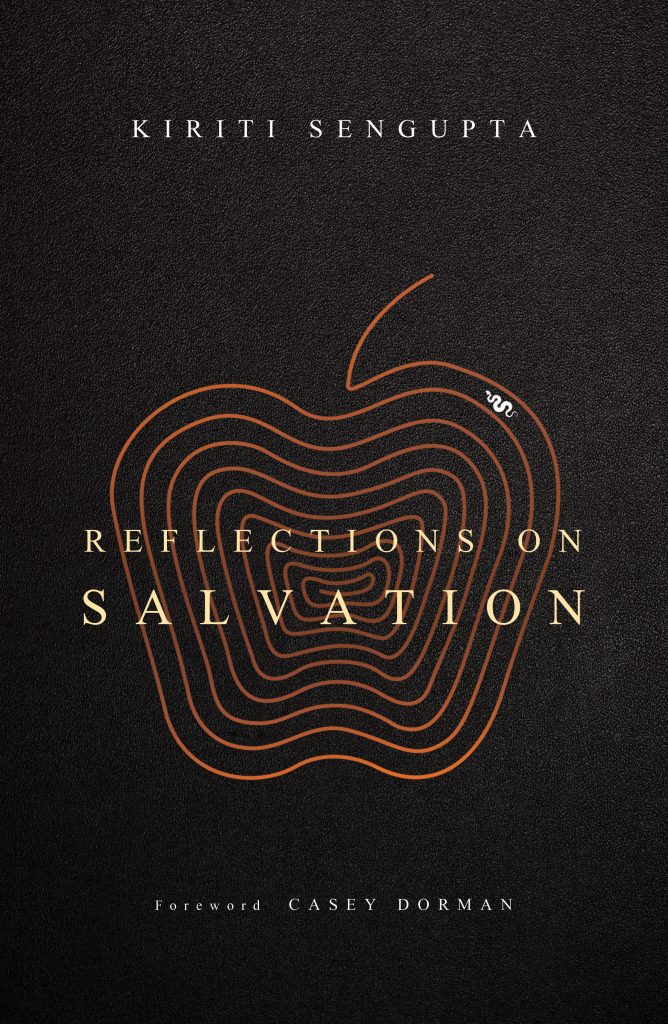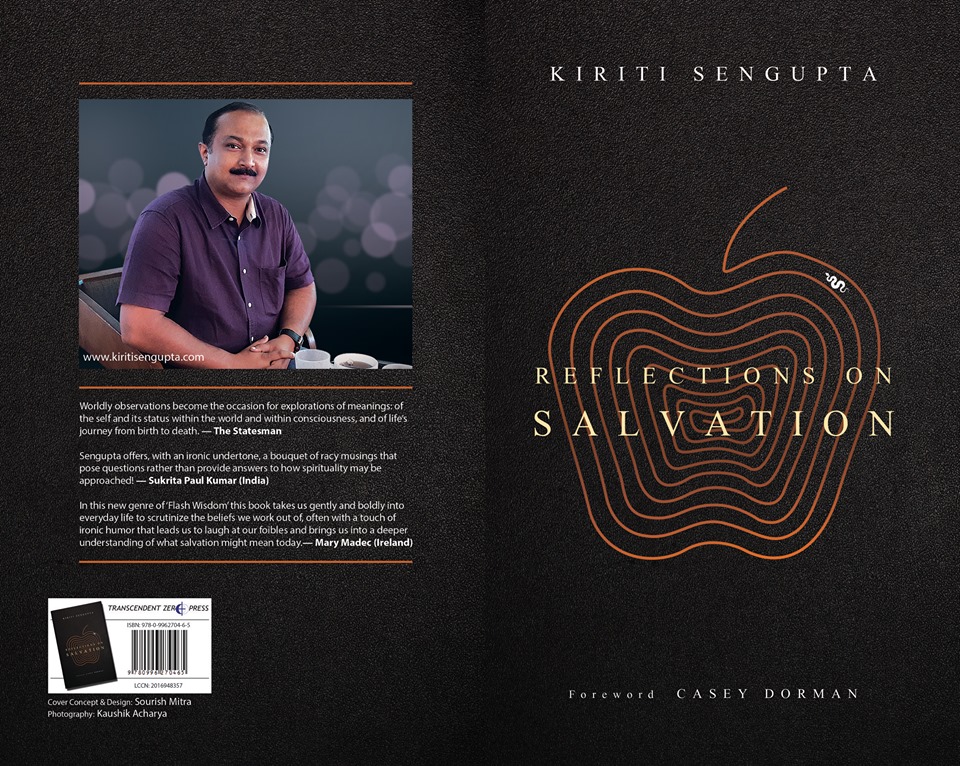Review
By
Tanmoy Bhattacharjee
A saga of beliefs, doubts, and questions!
Relations, let alone inter or intra, get reversed often. For a casual say, an examiner and examinee. Examination is the prime determining factor here. For, the know-all becomes know-not to check the know-what. Likewise, when I study a subject written by an author, my job, should I say is to know the angular inception, definitely not to burden my reading with my pre-conception. Kiriti Sengupta’s Reflections on Salvation, is my now-concern. I am far from being stuffed with salvation; no doubt a loaded term, I suppose, and I would dare then again to reimburse my reader-response in reflecting the what, how, and when of the reflected.
Similar logistics of perceptivity finds spacious room in the frankly deliberative note of the publisher of the book, Dustin Pickering: “This small collection of doubts, questions, and reflections is aimed at those who feel our traditions are too narrow and not contemporary enough to speak to the modern mind.” Are the pieces of ‘flash wisdom’ then arrow at the long-stubborn debate of tradition and modernity?
“You perform and we call it a performance. Shakespeare said, “All the world’s a stage. What if you have no audience? What if you are not applauded? … did you deliver your best?”
Any reader of the above lines may get confused to compliment it with an excerpt posing few questions to think upon and write. You want to learn, but no teacher is there. You want to teach, but no learners are there. Even you want to write, but no idea is there. Bloody useless, isn’t it?
Don’t you feel something overwhelming inside when a piece of lined up observations remind you to look back? Especially when they say: “What is the life if full of care/ we have no time to stand and stare.”
Return is the bloody why, the search of which makes us restless. And when the purpose served, we feel cool, cosy, and coveted. But, what about redemption? Renunciation? Do we bother feeling about those apparently regressive zones? This is how Sengupta heads a return: “With attention comes attachment; here renunciation is a far cry from living a life of an ascetic!”
Elevation or Emancipation. Take your pick. Long back “honey-tongued” Shakespeare in his “sugared sonnets” created a tsunami of thoughts—paved the way for new gusto. Flux and reflux, inlets and outlets are many. But Exit point is one. Come on! Shed your doubts. Sengupta meditates on one say of Ramkrishna: “Your business is to eat mangoes … go and eat them.”
Fire — Follow — Fruits. How about such alliterative ascent of achievement? They say, burn yourself first to shine first. I mean, love sun, do shine, be shiny. That’s cool. Actually you can’t do anything, for you need money to earn money. Just like you need liberation, and you go for a yajna with utmost liberality of uncaring for ghee and tree. Sengupta’s subtle satire sounds sublime here in the poem “Fire”: “How would two give birth to one when they are poles apart?”
“Let me enjoy a last puff.” — Attachment, or addictive adjustment? The common chord of attachment for everybody remains unaffected, even it stands higher of any promissory trust, faith, and hold. You can take the handy instance of a moth that first circles around the fire, then it’s attracted to that fire, knowing very well that it’s going to die. Ulyssean dictum, “I will drink life to the lees” may not be substituted as a fitting hit always.
“Enough you said about getting rid of expectations, didn’t you?” — Sengupta’s soft bother reminds us of the Shakespearean dictum once again, “Expectation is the root of all heartache.”
Colour. Conduct. Cow. Three distinctively nominal address. But strange they link into religiosity. Necessity knows no laws, and religion outlaws. The colour you adopt and adapt advocates for your prayers. You give and get attention, right? Even pray promotes to prey sometimes. Not only you sacrifice animals, sometimes you vows to donate cows. Objective? Attention, of course. This time you look for ephemeral bliss. Sengupta perfectly captures you there in the poem “Cow” as the priest said, “I’m delighted and so are the gods.” Even you cannot object to his candid rebuttal, “If scriptures are made for the humans, what about humanity?”
“Trauma necessarily precedes wisdom.”—the trauma he refers to is commonly seen as crisis. Sengupta’s professional expertise includes well his sense of wisdom tooth. But that’s not all, he questions the position of wisdom like T.S. Eliot: “Where is the life we have lost in living?/ Where is the wisdom we have lost in knowledge?/ Where is the knowledge we have lost in information? [“The Rock”]
“‘I’ stands for ignorant instinct?” May be objective or subjective, the ‘I’ is very much there in all what you do. You do not usually offer any second thought, I’m afraid I might be wrong, to give a light jerk even to your ‘I’ which may have the real meaning as instinct, or ignorance, or even inception too it may turn. Christopher Nolan’s movie Inception, by the way, can put you in a knee-jerk realization when you come to doubt your real ‘I’. The time you are awake is really the time you live on this earth, or the time you go to sleep and journey for a dream state, is actually the time you are alive. Therefore, you are awakened at an alarm ringing not to come back to reality, but it may be that now is your time to get back to stupor. Well, identity may also fit the bill for your ‘I’.
Oh my gods! Though “God is one and amorphous,” the existence and role of the gods are the enigmas that remain ever unsolved. Sengupta’s treatment of the gods in a few poems in this collection, may be in challenging conventional notions, but allows you to perceive them the other way round: “When I’m worshipping the gods, they are, in fact, worshipping themselves.”
Sengupta also speaks for your own self but invisibly: “Inside a darkened room you, step one, sit on a mat. Close your eyes, and think of doing dhyana.” What is this for? Communion with the gods, I guess, but, the author suspects a probable “link failure” as he claims: “Even an ovum awaits communion to become a zygote.”
You do dhyana, you donate cows, and you arrange for yajna. But efforts seem futile when they fail to fetch earthly results. And then, you no longer adhere to your conviction. “Who has been advocating detachment down the ages, by the way?”— This is how Sengupta holds a mirror before you.
“No matter if you sacrifice your sweat and blood, or feel exhausted, you are to consider yourself duty-bound.” Through the reference of Roma and Bhabapagla, the author puts the say-so ‘che sara sara’ (what will be, will be) into insecurity. For, the more you perform your duty, the more you acquire “beauty.” Does he mean material gain, or securing reservation unto eternity? However, “Act, but forget.”
Saffron — Suffering — Salvation — Sadhu. Practical and approving serial, isn’t it? But, “Is the monk honest enough to be named a sadhu?,” Sengupta inquires. “He acknowledges his thoughts and words are often in conflict with his peers and religious scholars, but he argues, “Salvation is but enlightenment, achievable only by actions, and through your sensory gateways. Pleasure of exploring and realizing the unknown arrives only through eyes, ears, nose, tongue, or skin.”” [an excerpt from the postscript by Alan Jankowski].
Is salvation the ultimatum? A must-have? Something we all are destined to? Freeing of one’s self? Speculations cannot undertone the liberal voice of an author, questioning the self: “If salvation is the goal, spontaneity is the key!”
Alan W. Jankowski, while reviewing the total of the task-ridden Sengupta’s thoughts and words, states, “Certainly most of us, if not all, have had similar thoughts, and Kiriti is quick to acknowledge his interpretations of things are no more valid than anyone else’s.” What else better can be the way of admitting the futility in utility than, “Situations change, but scriptures remain the same. Mundane!”
‘Reflections on Salvation‘ by Kiriti Sengupta is published by Transcendent Zero Press, Houston, Texas.
Kiriti Sengupta
Kiriti Sengupta is the author of the best-selling trilogy: My Glass of Wine [novelette based on autobiographic poetry], The Reverse Tree [nonfictional memoir], and Healing Waters Floating Lamps [poetry]. He is a bilingual poet and translator in both Bengali and English. Sengupta’s other works include: The Earthen Flute [poetry], A Freshman’s Welcome [a chapbook on memoir with literary critique], My Dazzling Bards [literary critique], The Reciting Pens [interviews of three published Bengali poets along with translations of a few of their poems], The Unheard I [literary nonfiction], Desirous Water [poems by Sumita Nandy, contributed as the translator], and Poem Continuous – Reincarnated Expressions [poems by Bibhas Roy Chowdhury, contributed as the translator]. His poems have been widely anthologized, both nationally and internationally in Kritya, Taj Mahal Review, Labyrinth, Grey Sparrow Journal, Dukool,Wilderness House Literary Review, among other places. Reviews of his works can be read on The Fox Chase Review and Reading Series, Muse India, Red Fez Magazine,Word Riot, and in The Hindu Literary Review, to name but a few. Sengupta has also co-edited four anthologies: Scaling Heights, Jora Sanko – The Joined Bridge, Epitaphs, and Sankarak.





Very good.